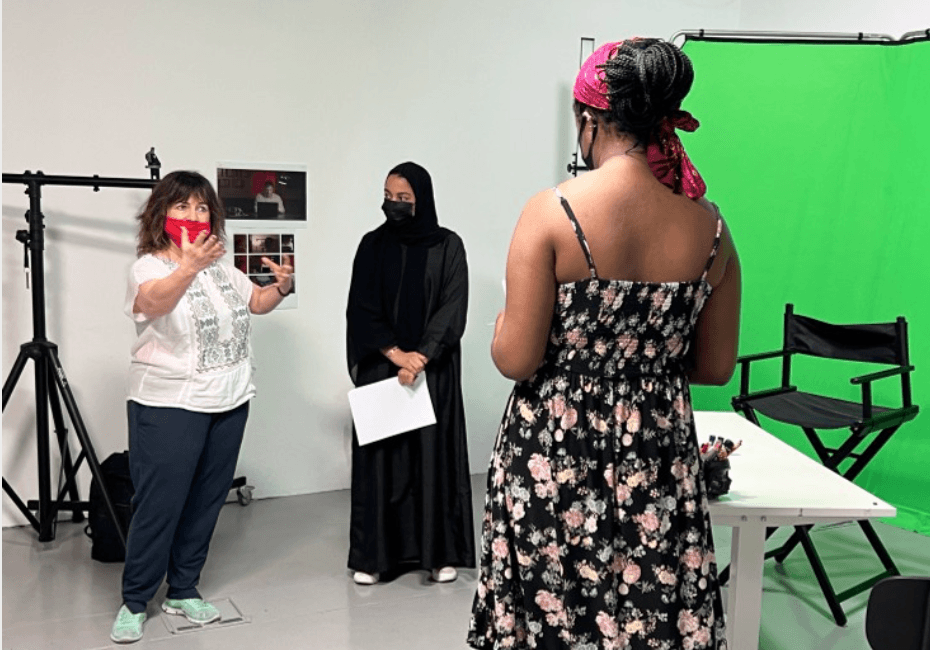Wherever they are in the world, women experience gender bias, discrimination and stereotyping.
But this common challenge intersects with other factors too – such as race, ethnicity, religion and socio economic status and it is this combination of issues that make each woman’s experience so unique.
My own practice reflects this and invites women to explore the specific vocal traditions they have grown up with; the moments that shaped the voice they have and use now.
Forming our voices
It can be transformational to explore the way these various interlocking social and personal factors have formed our voices.

I recently completed an MA at the Royal Central School of Speech and Drama at the University of London. My thesis focussed on presence – something that sits at the core of my practice.
I am passionate about my work with women, offering tools they can use to create impact and presence in any setting, and enhancing their physical, vocal and emotional energy.
But why is a woman’s voice and presence so important?
Growing confidence
I remember going home after my first term at university some thirty years ago. I was in proud possession of my developing ability to assert myself, express my ideas and engage in debates. My mother was shocked by my growing confidence and told me in no uncertain terms that disagreeing with adults (I guess I was 18) was terribly rude,
Okay, this was a different era. But how much have things really changed?
Throughout history, women have often been marginalised and silenced in professional, social and domestic settings. Being silenced has to do with voice. Telling stories and claiming stories in the world has to do with voice. Voice has to do with human rights.
Knowing you have a voice, a presence, is empowering. It enables women to assert themselves, articulate their ideas and convictions, advocate for their rights, and confront and dismantle inequalities, both on an individual scale and within the broader social framework.
Fear of being labelled
If I take it from the global level into the workspace, I think most women recognise the feeling of not being able to get their point across, or fighting perceptions of the kind of roles they should play. Some women avoid assertive communication out of fear of being labelled aggressive, and this limits their ability to express themselves effectively. A common example is that women say ‘I’m sorry’ more frequently than men. We do this as a ritualised means of expressing concern, but it makes us appear less confident.
Top tips for improving presence and voice
- Relax. Any tension, anywhere in your body, affects your presence and your voice.
- Breathe. Your voice can only go where the breath goes.
- Posture. You don’t have to stand like a soldier on parade but do have an awareness of good posture. A confident posture translates into a more authoritative voice.
- Space. Don’t view space as something to be claimed, conquered or owned. There’s enough to go round! You already change the space with your presence.
- Practice Active Listening. Being a good listener enhances your presence in conversations.
One of my favourite quotes is by English scholar, Dame Mary Beard: “an integral part of growing up, as a man, is learning to take control of public utterance and to silence the female of the species.” So the issue of inequality of voice is huge.
Training courses in presence and impact frequently exhort women to take up space or command space. The implication here is that we start smaller (than men), and need make ourselves bigger. Really? Should we – in 2023 – be asking women to behave like men in order to be more present? My work focusses on how we embody space, not how much space we embody.
Gender inequalities
My work in corporate training in the United Arab Emirates was my springboard to researching presence in leadership, delving into the inner workings of the corporate world's hierarchy – the system that determines whether you belong, wield power, and exude confidence or come across as less effective. I argued that this system expects us to conform to traditional, masculine norms. Simply asking women to “lean in” and be as assertive as their male counterparts risks exacerbating existing gender inequalities.
I recently trained with Patsy Rodenburg, one of the world’s foremost voice and speech trainers. I felt a transformation within an hour – simply lifting and dropping my shoulders and being aware of how that affected my breath - and therefore my voice.
‘Standing in readiness’ is a favourite of mine. Imagine you are a car – I often pretend I’m a Ferrari - waiting for the traffic lights to turn green. Embody the sensation of revving up, your foot hovering over the accelerator pedal, ready to put your foot down and go. It gets you up on your toes and you can feel the energy moving through your body. This simple exercise connects you to your presence. Presence is an energy. It is in our bodies, our breath, our voice, our speech, our attention, the connection we make with others and how we perceive and use our power. This exercise is really popular in Dubai (where I live), where everybody is always in a rush to drive away from the lights … and there are a lot of Ferraris, too!
Josie Campbell is an actor and trainer and has a consultancy Josie Campbell Voice based in Dubai. She has recently completed an MA at the Royal Central School of Speech and Drama.
Find out more about Aurora and the impact it has had on women and institutions in its first 10 years.